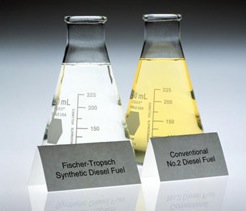
Back Сінтэтычнае паліва Byelorussian Сынтэтычнае паліва BE-X-OLD Combustible sintètic Catalan Syntetisk brændstof Danish Synthetischer Kraftstoff German Combustible sintético Spanish سوخت ترکیبی Persian Essence synthétique French Sintetička goriva Croatian Bahan bakar sintetis ID

Synthetic fuel or synfuel is a liquid fuel, or sometimes gaseous fuel, obtained from syngas, a mixture of carbon monoxide and hydrogen, in which the syngas was derived from gasification of solid feedstocks such as coal or biomass or by reforming of natural gas.[1]
Common ways for refining synthetic fuels include the Fischer–Tropsch conversion,[2][3][better source needed] methanol to gasoline conversion,[4][better source needed] or direct coal liquefaction.[5][better source needed]
- ^ Ruth, John C; Stephanopoulos, Gregory (2023). "Synthetic fuels: what are they and where do they come from?". Current Opinion in Biotechnology. 81: 102919. doi:10.1016/j.copbio.2023.102919.
- ^ "Liquid Fuels - Fischer-Tropsch Synthesis". Gasifipedia. National Energy Technology Laboratory, U.S. Department of Energy. Archived from the original on 8 June 2014. Retrieved 25 July 2014.
- ^ J. Loosdrecht, Van De; Botes, F. G.; Ciobica, I. M.; Ferreira, A. C.; Gibson, P.; Moodley, D. J.; Saib, A. M.; Visagie, J. L.; Weststrate, C. J.; Niemantsverdriet, J. W. (2013). "Fischer-Tropsch synthesis: catalysts and chemistry". Comprehensive Inorganic Chemistry II: From Elements to Applications. Surface Inorganic Chemistry and Heterogeneous Catalysis: 525–557. doi:10.1016/B978-0-08-097774-4.00729-4. ISBN 9780080965291.
- ^ "Liquid Fuels - Conversion of Methanol to Gasoline". Gasifipedia. National Energy Technology Laboratory, U.S. Department of Energy. Archived from the original on 24 May 2014. Retrieved 25 July 2014.
- ^ "Liquid Fuels - Direct Liquefaction Processes". Gasifipedia. National Energy Technology Laboratory, U.S. Department of Energy. Archived from the original on 24 May 2014. Retrieved 25 July 2014.